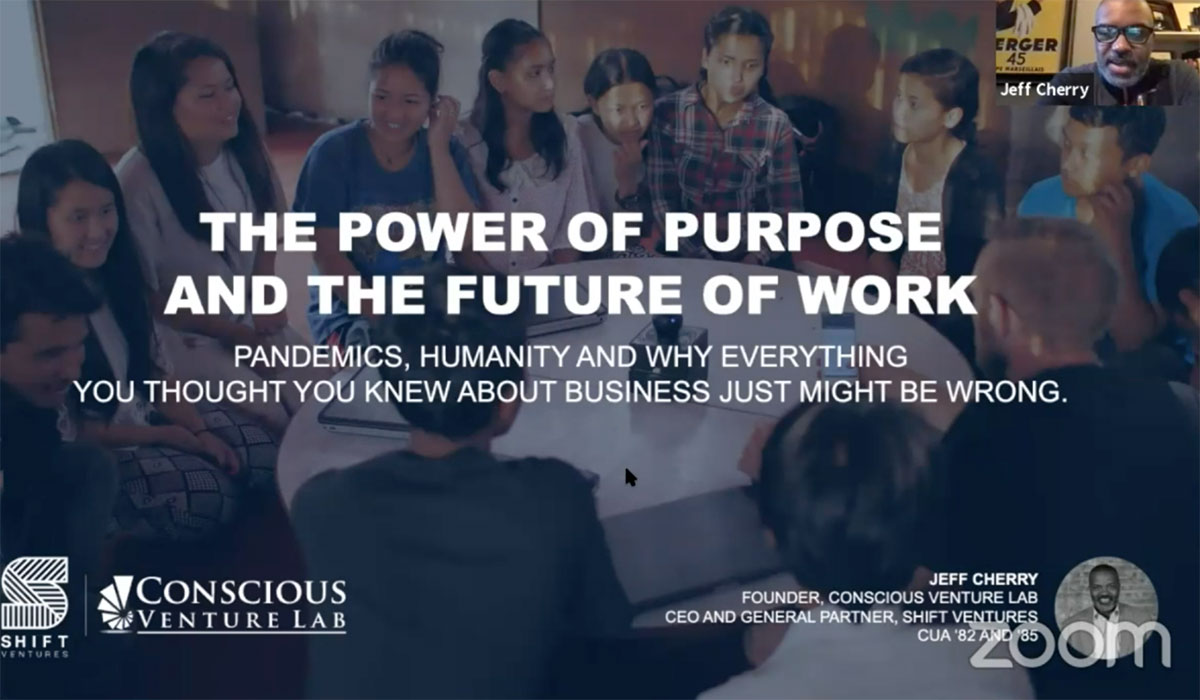

The Busch School of Business hosted their first online CEO lecture with alumnus Jeff Cherry B.A. ‘82, M.A. ‘85, founder and executive director of Conscious Venture Lab on April 7.
Andrew Abela, dean and associate professor of marketing, introduced Cherry and described him as “a champion for the transformation of capitalism – he works with private investors and early stage businesses with the goal of creating businesses that are operating at the cross-section of profit and purpose.”
The lecture, titled, “The Power of Purpose and The Future of Work,” examined what is happening in society with the pandemic and discussed how long-believed ideas about business might be wrong.
“We can’t stay stagnant as society evolves. The way we think about capitalism and business must evolve too,” Cherry said.
Cherry started his own architecture firm in 1986. After working with the Academy for Neuroscience in Architecture, he started to think about how he could use the physical environment to drive behavior, especially with his corporate clients. With this in mind, he created a consulting firm in 1989 and brought together the physical, technological, and cultural environments.
“We brought these pillars together as a way to essentially redefine how our clients thought about the environment and use all three pieces to help them craft an environment that would drive strategically aligned behavior,” Cherry said.
As the business grew, he noticed his corporate clients were asking questions based on two things: money and people. Cherry said, “those companies thinking about people first created cultures of caring; an emergence of what we now call conscious capitalism.
“Businesses that were emerging as the most successful were finding ways to solve problems and engage all of their stakeholders,” Cherry said. “My partner and I became enamored with this idea that there was a new story being told in capitalism.” They decided to sell the company in 2006 and start a hedge fund called The Concinty Group, the first hedge fund for conscious companies during the recession.
Despite the economy at that time, their ideas proved to be successful. “The main reason these businesses were successful is this idea of shareholder myopia,” Cherry said. “Oftentimes managers and executives who are focused on the old narrative of businesses do so to the detriment of all the other stakeholders required to create value.” That, he said, “actually erodes long-term corporate performance, and thus, long-term shareholder value.”
In 2012 Cherry left the hedge fund and started Conscious Venture Lab, an accelerator venture capital fund, focusing on investing in and training entrepreneurs to build a stakeholder conscious mindset into their business.
“I was looking for a way to transform the way people felt about capitalism,” he said. “I think the catalyst needed to be a grassroots movement.”
With the coronavirus pandemic, “I think we’re at a crossroads, because things aren’t going to go back to the way they were or we’re going to experience a new normal,” said Cherry. “We have to think about how to create a more resilient society and economy. And what role should business play?”
Cherry wanted viewers to consider that crisis breeds innovation.
One example of this were the riots in Baltimore, Md. following Freddie Gray’s death. Cherry explained “the riots weren’t just about police brutality, it was also about not investing in minority communities in the city.” After the riots, Conscious Venture Lab moved to Baltimore City to focus on investing in minority and female owners.
“We should be thinking about how we are going to innovate during this period to be in a better position for the next big shock we’re bound to experience,” Cherry said. He believes that businesses that build economic, personal, and societal resilience into their models will be the winners if we choose that as a new direction.
“There are going to be great companies founded during this time that will help us through the next pandemic, but that won’t happen if we don’t support them,” Cherry said. “I think we’re presented with an opportunity to turn capitalism into something new, into an instrument of humanity. If we take this idea of business as a tool of humanity, I think that is a path to a more profitable, more sustainable, more just, and more joyful society and business.”